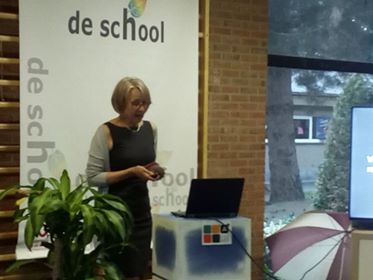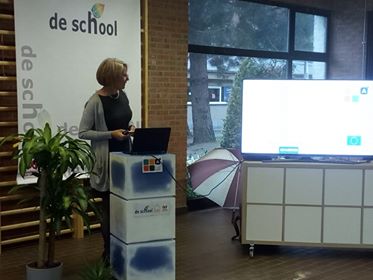Kick off event at Ter Beuke School
- jmthomson
- Apr 29, 2019
- 2 min read
Updated: May 15, 2019
The Kick off event on 24 April 2019 at the Primary School in Kessel Lo Leuven gathered a wide array of stakeholders. Ter Beuke's Director Hans Van Gelder welcomed teachers, parents, policy makers, representatives of parents' networks, local press and school directors from schools in the district.
European Project Manager Jacqueline Tordoir explained how A is for App came to be and what the next 2 years will bring. Her quest for Fluency Apps for her daughter a few years back, ended up in a series of questions on where to look for Apps that were both high quality and fun. Inspired by a Sept 2012 report by a EU High Level Group on literacy and digitalisation, she brought together universities, schools and dyslexia centres in 4 EU countries with the goal to bringing cutting edge digital reading tools into the classroom, especially for the benefit of struggling readers. Jacqueline said: "The report called everyone to action, given that 1 in 5 of 15-year olds lack basic literacy skills.
When I read "Act now!" I started preparing this project first locally and then at European level".
Hans Van Gelder, Ter Beuke's recently appointed school director, inherited the decision from his predecessor to take part in the project. " I did not hesitate to get my 2 schools to participate fully in A is for App", he stated. "It fits in perfectly with our school project: "Het Jaar van de Taal", "The Year of Language". This is all about giving pupils the "goesting" = " a passion/taste" for reading and writing, so they can discover the fun in writing love letters and how rich an experience reading a good history story can be".
Pol Ghesquière, Professor in Learning Disabilities at the Faculty of Psychology and Educational Sciences of the KU Leuven, gave the scientific background to the 3 stages in reading development: Decoding, Reading fluency, and Reading Comprehension. Pol explained how accuracy is an important aspect to reading fluency and that once this is skill is automised, reading for pleasure becomes a possibility. He explained the relative scarcity of good apps for fluency and the selection of 5 fluency apps in the pilot phase of testing, each with elements that will lead to ideas for better fluency apps at the end of the project. Pol explained that the technological advantages of apps leading to automisation and accuracy are numerous. "The goal of this project is to make parents and children active partners in determining what makes an app an attractive tool for learning. The project is unique in that it combines scientific knowledge, serious games findings from app developers and qualitative feedback from app users, which can only lead to better reading skills by both struggling readers and excellent ones in the near future. " Prof Ghesquière stated.
You can find materials from the event here.












Comments